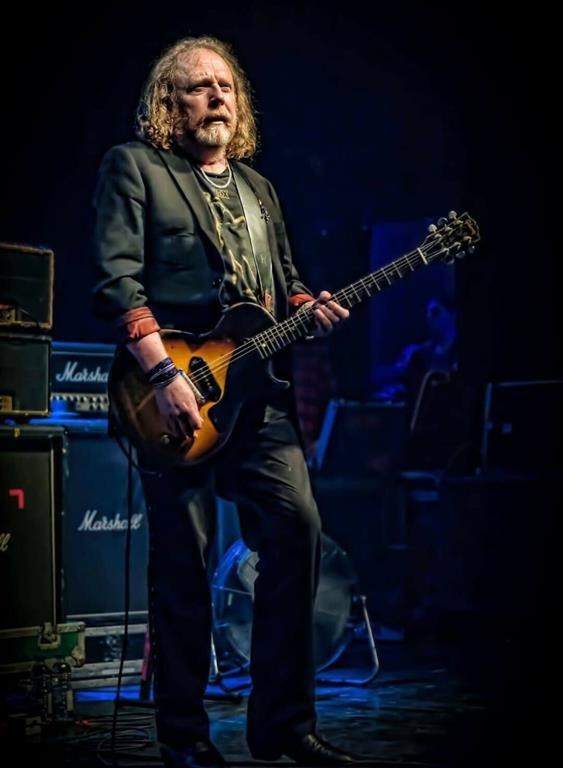TORONTO — Gord Lewis played a "ferocious" guitar in Hamilton punk rock act Teenage Head and his bandmates intend to honour him with a series of upcoming concerts.
Teenage Head's members say they've made the "difficult decision" to fulfil three gigs booked before the 65-year-old guitarist was found dead last Sunday in his Hamilton apartment.
In a message posted on the band's Facebook page and co-signed by the Lewis family, they say the shows will be a way to "honour our fallen brother and start the process of healing."
Teenage Head will play Winnipeg on Thursday, Saskatoon on Aug. 20 and Oakville, Ont., on Sept. 10.
On Wednesday, Hamilton police confirmed Lewis was the city's third homicide this year. Jonathan Lewis, the musician's 41-year-old son, is charged with second-degree murder.
Police did not disclose the exact cause of death or say when Lewis died.
Teenage Head formed in a Hamilton high school and rose to prominence in the early 1980s as the punk rock movement evolved after being led by the Ramones, the New York Dolls and the Sex Pistols. Those bands commonly became tied to anti-establishment messages, while the Canadian four-piece found their motivations elsewhere.
Their self-titled debut included their first single, "Picture My Face," a scrappy breakup song driven by Lewis's gritty guitar.
"Teenage Head sang about girls, cars and fun times," said Lou Molinaro, a longtime fan and friend.
"(They) never sang about political problems, strife or any international issues."
Molinaro discovered Teenage Head as an adolescent in the summer of 1980 when he attended their now notorious concert at Toronto's Ontario Place, which sparked a riot and splashed the band across headlines as notorious troublemakers.
As a fan, he was stunned by the concert experience, but Molinaro says the more he listened, the more he was drawn in by Lewis's unique guitar skills.
"It was thick, full and raunchy, but it was a signature sound that only Gordie could play," he said.
"There has been a lot of guitar players over the years that have tried to emulate it, but they haven't."
After the riot, Teenage Head was on the rise, but just as momentum picked up for a U.S. breakthrough, Lewis was seriously injured in a car crash. The accident derailed plans for a run at U.S. fame and forced Lewis into recovery for the better part of a year — practically a lifetime in music.
"The record labels back in 1981 were moving quickly away from homegrown rock 'n' roll and set their eyes on the U.K.," said rock music publicist and analyst Eric Alper.
"(Attention went to) helping develop Duran Duran, Eurythmics and Culture Club. By then, Teenage Head wasn't a priority in the U.S. for anybody to work with."
After scuffles with their U.S. label, the band eventually started to fall apart, and by the mid-1980s, lead singer Frankie Venom had gone off to start a new project. The band would re-form in various iterations in the years that followed.
It was a decade later in 1996 when teenage fan Molinaro connected with his idol guitarist Lewis while kicking off his Mohawk College radio show. He asked Lewis for an interview that spanned the story of Teenage Head and the conversation led the two to become fast friends.
Concerned about Lewis's disconnect from the music industry, Molinaro considered ways to allow Lewis to shine with his own platform. As co-owner of Hamilton bar This Ain't Hollywood, he began booking the guitarist as a regular guest.
"I was shattered because I thought Gord has never done anything other than be a rock 'n' roll guitar player," he said.
"I had this idea of starting a weekly open stage with Gord Lewis. We called it the Gord Lewis Songbook. And it was basically local Hamiltonians (who) had a chance to go up on stage and sing a Teenage Head song or accompany Gord on guitar."
Molinaro said in those days, he learned more about the "two-sided coin" that defined Lewis's personality.Â
"There's the rock 'n' roll guitar player with that ferocious sound, and then there's a quiet, gentle Gord," he said.
"Gord's guitar playing was very therapeutic for him. There were many times when we all knew that Gord was having struggles. And any time he got up on that stage, he was always very nervous," he added.
"But once he got up and started playing those first few chords, that stage was his."
The surviving members of Teenage Head say they hope their upcoming shows honour Lewis's legacy as the guitarist "wanted his music heard and wanted it to live on."
"We are hurting, his family is hurting, our city is hurting," they wrote.
"Gordie's fans across the world are hurting. He loved you all."
This report by The Canadian Press was first published Aug. 12, 2022.
David Friend, The Canadian Press


.png;w=120;h=80;mode=crop)

